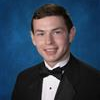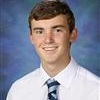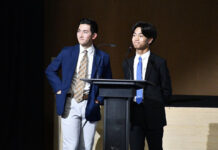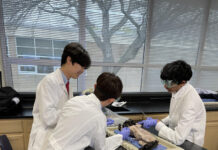All the cool things that you think you did this past summer pale in comparison to what seniors Zachary Bishkin, Dylan Roberts, and Evan Loriot got to experience at Dallas’ UT Southwestern Medical Center. For eight weeks, each of these three students performed research alongside a medical professional in UT Southwestern’s labs as part of a paid summer internship, an experience afforded to them by the STARS (Science Teacher Access to Resources at Southwestern) Program. Bishkin, Roberts, and Loriot received this special opportunity only after enduring a rigorous application process made available to them as members of Jesuit’s Medical Society. On Tuesday, October 7th, they concluded their participation in the program when they presented the results of their extensive research in the Terry Center to Dr. Stuart Ravnik and Mrs. Lynn Tam (the directors of the STARS program), the entire Medical Society, and other proud members of the Jesuit community.

Intrigued by the interesting opportunity that the STARS Program provided, Bishkin decided to take a chance and see where the internship would lead him. He became familiar with the program through his previous experience as a writer for the Roundup. “I was the Roundup reporter who wrote the article about the STARS students the year before me. After hearing about what the opportunities that STARS offers, my interest was certainly piqued,” recalled Bishkin. This curiosity was affirmed when his physics teacher, Mr. Andrew Katz, told him that he would be the ideal applicant for the prestigious program.
Originally, Bishkin was overwhelmed by the complexity of the project he was to work on with Dr. Qinghua Liu, in which the main goal was “to figure out how to purify HP1BP3 (a protein that regulates the processing of miRNA throughout its developing stages) and H1B (an isoform) to a high purity and concentration.” Now this task would be challenging even for an experienced biochemist, but was especially daunting for Bishkin, who “started out with no knowledge of RNA” and resorted to receiving tutoring from Mr. Katz during the beginning of the summer to familiarize himself with the science. It even took “a few weeks” for him to “learn where everything [was]” in the lab. However, with a great amount of time and dedication, and a receptive brain, he was able to overcome these setbacks and produce a successful presentation.
The hardest part for Bishkin was not understanding the material studied in the lab, but trying to figure out how to explain the project to people who had no research experience. “This was the first time I presented outside the research community,” he remarked, as he had presented his research numerous times to other researchers along the way. He also mentioned the difficulty in “explaining the science without jargon,” which had become “instinctual” throughout the eight weeks spent in the lab.
Despite all of the grueling work that the project entailed, Bishkin described his eight weeks in the lab as “the most rewarding experience I have ever had the pleasure of partaking in.” However, even with the immense appreciation he holds for the many valuable things that it taught him, one stood out in particular: “Perhaps I might be better suited for practicing medicine. Research takes a certain type of person, and I don’t know if I fit that profile entirely.” One thing is for sure- he will always look fondly and gratefully on his experience with STARS and would recommend it to anyone who is considering being a part of the program.
Contrary to Bishkin’s coincidental interest in STARS, senior Dylan Roberts always knew he was going to apply. “I have always been interested in science throughout my high school years, specifically medical science,” he said.
Roberts presented the research he conducted to identify the function of certain neural cells in the accessory olfactory bulb in mice, or more simply, “to research how pheromones influence the social behavior in mice.” He described the whole entire process as very labor-intensive and professional, saying it “required several different steps that became a part of my daily work.” However, like Bishkin, he holds the program in very high esteem, remarking that “the STARS coordinators did a wonderful job of incorporating us students together, and my personal mentor and boss in the lab made me feel like a significant part of the lab’s progression.” Similarly, all of his high expectations for the program were not only met, but surpassed: “The work was very interesting, challenging, and stimulating… I had high hopes entering the program and they were well met.”

The STARS program has influenced Roberts so much that he is seriously considering pursuing a job in neuroscience after graduating. “The STARS program has given me a real career experience, and I am definitely going to keep neuroscience research as an option for a career,” he declared. He is certainly thankful for the treasured experience he gained during those eight weeks and would easily recommend the program to other prospective students.
For fellow senior and STARS participant Evan Loriot, applying for the position was done more out of curiosity than anything else: “I applied because I wanted to see what it would be like to do research in a lab. I was undecided as to whether or not I wanted to follow research as a career.” His inquisitiveness resulted in his studying for eight weeks the effects and localization of g-protein coupled receptors on the primary cilium of mouse kidney cells.
“Considering that it took over 400 hours of my summer, it was quite a bit of work- mini prepping, cloning, picking colonies, performing microscopies, the works,” said Loriot, obviously sharing with Bishkin and Roberts a strong appreciation for the sheer amount of time and effort that this project entailed. However, he certainly did not expect to actually be an integral part of his PhD’s research: “Honestly, I thought I would be doing grunt work, cleaning test tubes and whatnot, but instead I was able to actually do tests, perform diagnostics, and analyze problems,” learning in the process the “value of research and the kind of lifestyle associated with it.”

Initially, Loriot was intimidated by his unfamiliarity with the world of scientific research, confused by the advanced scientific lingo and the austere atmosphere. However, after getting accustomed to this strange new world, he “[started] to understand more about [his] topic,” further explaining that “the doctors are more than happy to explain things to you at a simple level.”
Overall, Loriot was very proud of the great accomplishment in his participation in the program, saying that “it was a lot of work, but well worth it.” He offered one last closing remark, revealing his deep gratitude for STARS and all that it meant to him: “It was a great learning experience in interacting with other researchers, and I am proud of the work that I accomplished.” His next goal is to do another internship sometime in the near future before going off to college to pursue a possible career in biomedical technology.
Medical Society President Sean Howard ’16 described the invaluable insight these three seniors acquired over the summer, explaining that “they gained priceless experience in and knowledge about research labs. They weren’t just someone’s assistant but actually contributed to various head researcher’s labs and experiments… Also, they have formed countless relationships with researchers and other students from around the world through the program.”
Mr. Max von Schlehenried, a physics teacher and faculty moderator of the Medical Society, disclosed that every time, he learns something new from these STARS presentations and looks forward to them every year. He lamented that these seniors’ participation in STARS and in Medical Society will have to come to a close, but offered some words of respect for their hard work and auspiciousness for their future endeavors, saying, “It’s bittersweet to see people get ready to move on. We are excited to see them go into the world and see what they’re going to do, but it is hard to see such good guys move on… I was very proud of them.”
However, Bishkin, Roberts, and Loriot were not the only members of the Jesuit community to be honored at the ceremony. Shortly after they presented their findings, Mrs. Jan Jones, freshman biology teacher and faculty head of the Medical Society, received an award from the Texas Medical Association for “her excellence in teaching and inspiring students,” said Howard. The prestigiousness of the honor can easily be appreciated considering that it is only awarded to three high school science teachers in the entire state of Texas. Accompanying the recognition were large monetary benefits, with sums of $5000 and $2000 being given to Mrs. Jones and the school, respectively. “Mrs. Jones definitely deserves [the award] for all her dedication… She has helped so many students find their passion in the field of medicine, including me,” remarked Howard, praising Mrs. Jones’ considerable and impactful guidance. “Mrs. Jones has opened so many doors for me, and I cannot thank her enough for it.”
For those current juniors who are interested in replicating Bishkin, Roberts, and Loriot’s experiences, von Schlehenried provided some words of wisdom. “Future members who are interested in doing STARS research should come see me or Mrs. Jones or Mrs. Boyle. The application process will start in December.” Congratulations Zach, Dylan, and Evan, and best of luck to you as you pursue scientific careers in the future!






